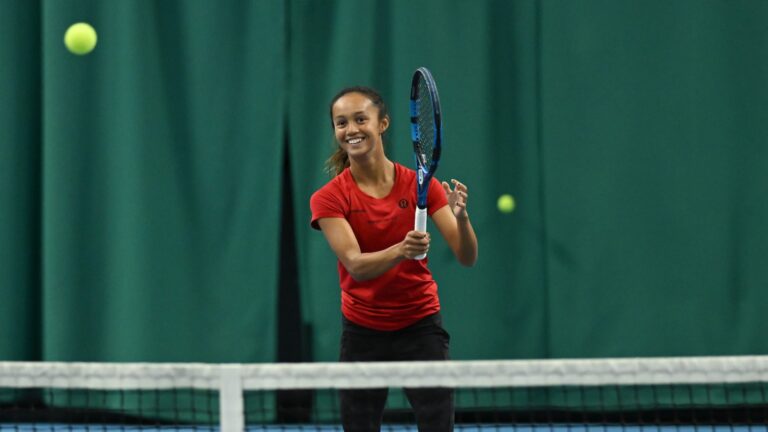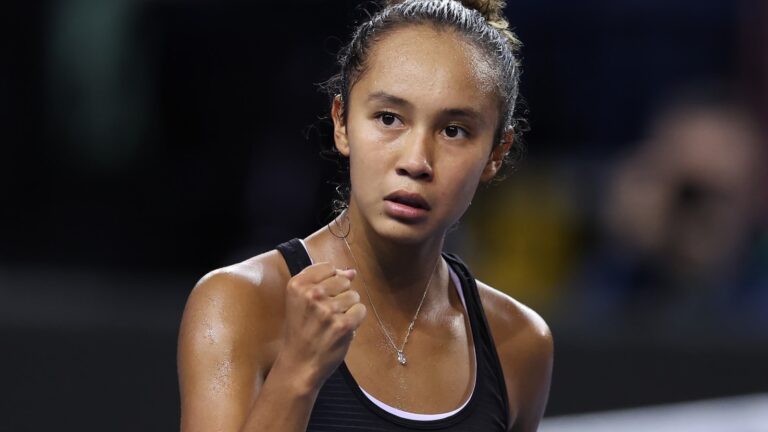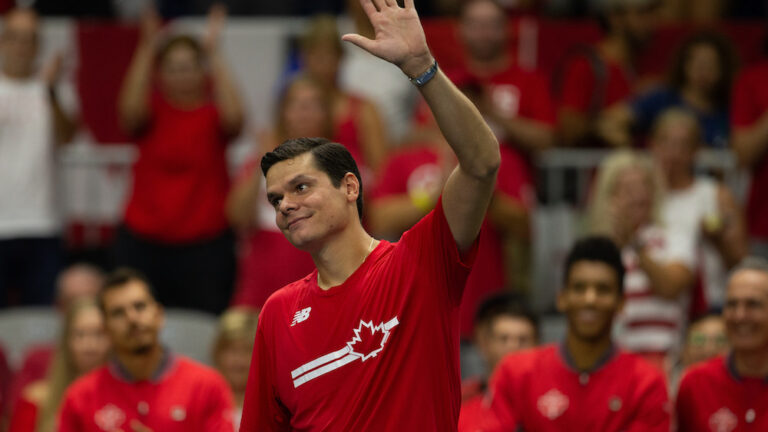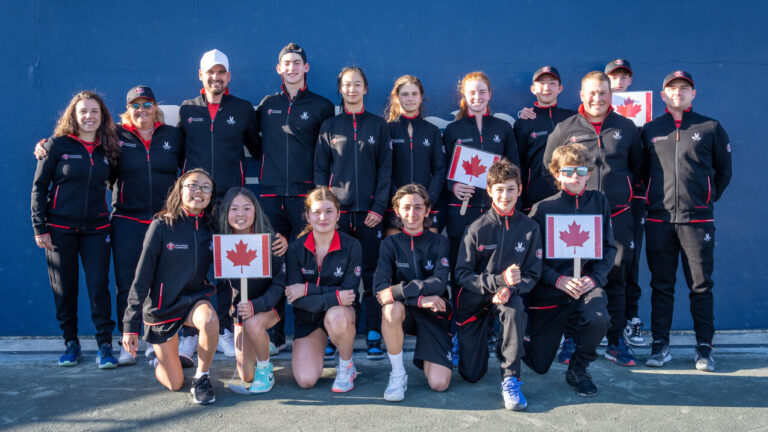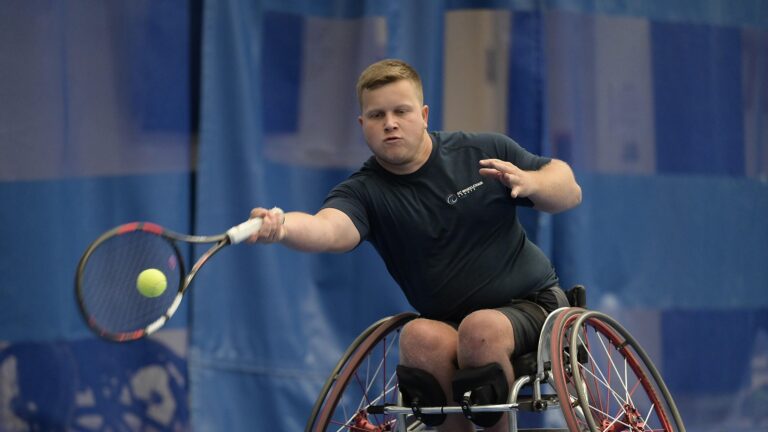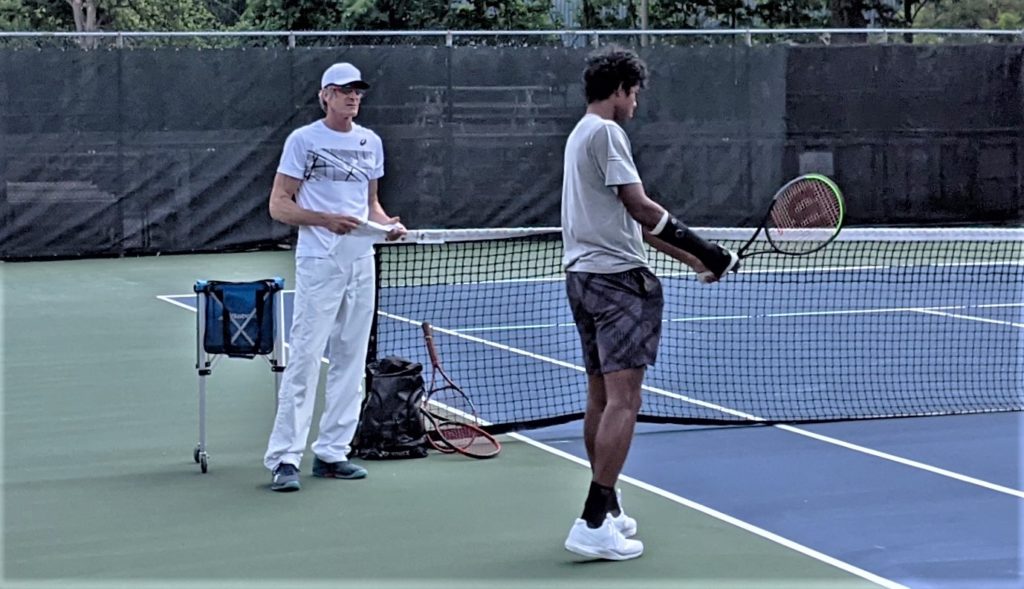
Photo : Paul Rivard
Just like summer itself, the frenzy of the last Grand Slam event of the season has come and gone.
Now that things have settled down, the pros are gearing up for the last leg of the season with a whole new set of goals, and most young hopefuls are getting back to their tennis and academic lessons after some exhilarating and enriching experiences.
That second group of players is the focus of my blog today, more specifically tennis through the lens of a Tennis Canada coach. And not just any coach—one who’s seen every side of the game over the past 35 years: pro player, coach, Davis Cup captain…He’s done it all.
I’m talking about Martin Laurendeau.
Allow me to depart from my usual format to recount large parts of a recent conversation I had with the calm, poised, eloquent and analytical coach many affectionately call Marty. He is the quiet force you see walking up and down the courts at the National Tennis Centre, explaining to fiery young aces how to calibrate their energy and fathom the extent of the opportunities that lie ahead by applying a few basic rules.
What more could an interviewer ask for?

Turning pro
Let’s not forget that Martin Laurendeau got his pro start as a student at Pepperdine University in 1986 and joined the ATP full-time a year later.
By 1988, he’d already reached his career high ranking of World No. 90 and the fourth round of the US Open, which remains one of his fondest memories as a player.
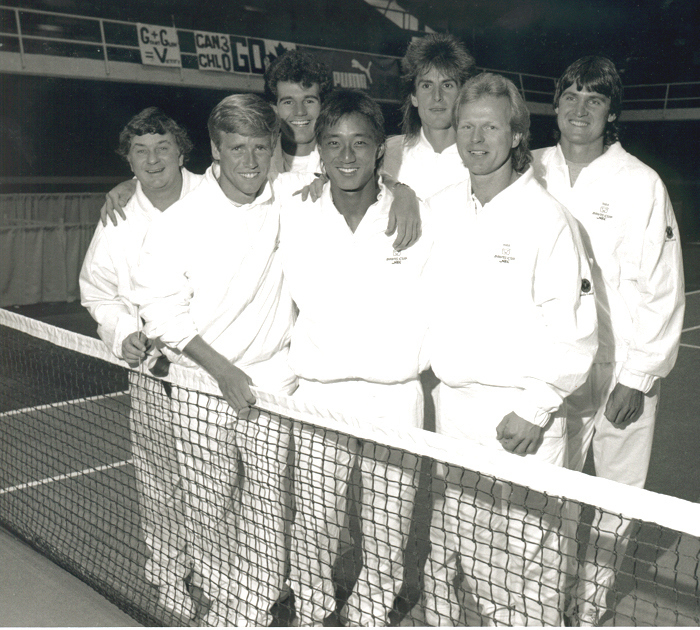
That’s the furthest I went at a Grand Slam tournament. I played in the third round at Wimbledon three years later, in 1991. And I had a few fantastic weeks when I won Challenger events.
It was a singular time. We Canadians were under the radar and pretty much on our own. Like pioneers, let’s say. We travelled the world from tournament to tournament. There was a handful of us, and we stuck together. But, yes, the US Open is a great memory because I had to play in the qualifiers. So, by the fourth round, I had already been playing for three weeks.
Turning coach
Your list of achievements as a coach is even more impressive. In your 15 years as the captain of the Davis Cup team, that 2013 win against Spain must mean a lot.
That’s the year we reached the semifinals. When we defeated Spain, that was the first time Canada ever won a round in World Group. After Spain, we beat Italy to go to the semis against Serbia. That was a key moment for the Davis Cup team: before those 15 years as captain, I was a coach for 11 years under different captains. Louis Cayer and Grant Connell both came before me. We spent decades in the qualifiers and lower levels to finally get to World Group in 1989, but we were eliminated in the opening round. We got back to World Group in 2012 and the semifinals in 2013.
Here, I’d like to interject and mention that Canada’s last semifinal berth at Davis Cup prior to 2013 was ONE HUNDRED YEARS EARLIER. The two eras just aren’t comparable.
Since then, Canada has spent eight years in World Group—something that’s very difficult. Today, it’s a bit of a given, but you have to remember all the efforts invested to get there and stay there.
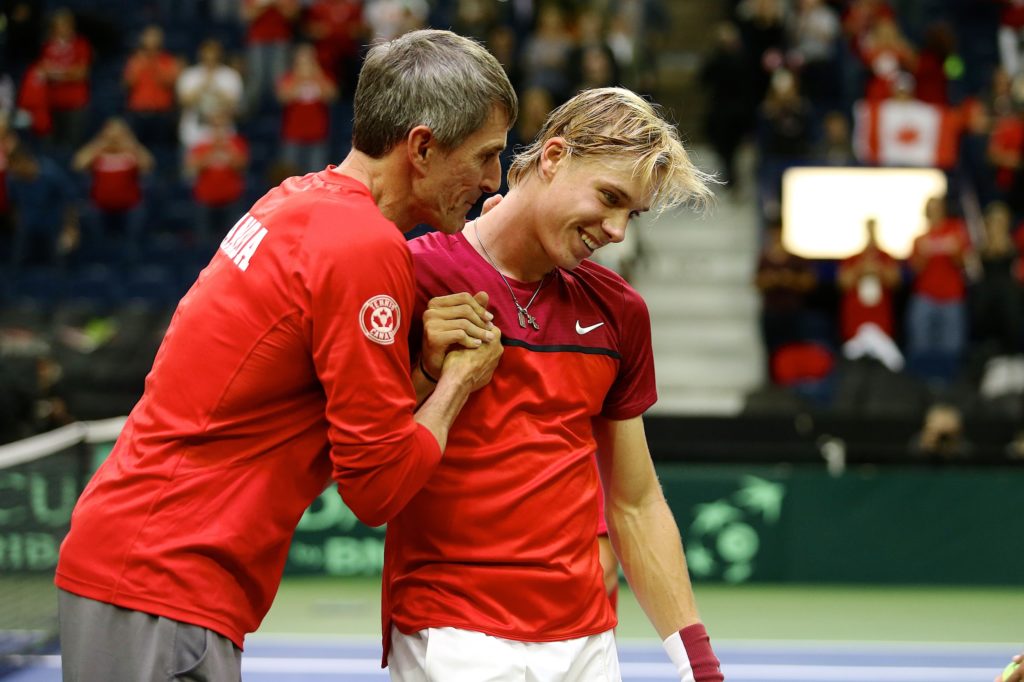
Chapter Shapo
Let’s talk about your time with Denis Shapovalov. Your biggest moment must have been that evening in August 2017, right?
Yes! That was great!
As far as background information, the win was one of the most tremendous surprises in the history of Canadian tennis, second only to the time World No.238 Daniel Nestor defeated No.1 Stefan Edberg at Davis Cup 1992. As for Shapovalov, he was No.253 on March 5, 2017. Heading into Rogers Cup five months later, he was No.143. By the time the final in Montréal had wrapped, the 18-year-old was No.67.
I have to also add the weeks prior. As a coach, an event isn’t necessarily a happy one ever year. You spend a lot of weeks with a player, and when the player realizes that her or his performances confirm the strategy, that’s very gratifying for the coach but doesn’t make headlines. It may be at a Futures or Challenger event. But that match against Nadal was really magical, I must admit.
You’d come a long way that season.
When I first started out with Denis, he was 17. He couldn’t get into tournaments. He was grinding it out at Challenger events. For example, in the weeks leading up to Rogers Cup, he played in Gatineau and Granby. He defeated Peter Polansky in the final in Gatineau and then met Polansky again in the semis in Granby and lost.
Then, that week, things really started to happen—beating World No.1 Nadal without having played an ATP 500 or ATP 250. It all happened just a few months after we’d started working together. He’d been able to elevate his game to achieve that. He followed up with a fourth-round at the US Open and took flight.
Yes, it was a great moment, as a coach, to have been able to support a player who’d started in the juniors and just EIGHT months later defeated the World No.1. It was a highlight of my career as a coach.
The greatest highlight?
In terms of achievement, for sure, because I’d never coached an athlete who defeated a No.1. But there were other major highlights, like early on in my coaching career when Sébastien Lareau beat a few top players. Here, in Montréal, he defeated Wimbledon champion and then World No.4 Richard Krajicek of the Netherlands.
You coached Sébastien? I’d forgotten!
Yes, for three years when he was starting out in Challenger events. He’s the first player I worked with. I was more of a private coach, like in my time. A player and coach would head out to secondary tournaments around the world for several years.
There was also Simon Larose, who defeated Gustavo Kuerten here in Montréal. And Sébastien LeBlanc who beat Tim Henman here also. There have been so many magical moments in this stadium.
Why did you move on from the Shapovalov team? Because of your back surgery?
I suffered a herniated disk at the Queen’s Club tournament in 2018, just a week before Wimbledon. My back seized up and I was in bad shape, but I stayed until after the first round. When Denis lost to Jerzy Janowicz, I went home. I literally had to use a wheelchair to get around. I couldn’t walk for three months. Mandatory rest.
Denis was in the middle of the hard court season: Rogers Cup, Cincinnati, US Open. Denis, his mother and his advisors decided they couldn’t wait for me to recover and join them. So, they found someone else.
Any bitterness? Do you chalk it up to fate?
I would have definitely liked to keep working on his game, which, in my opinion, wasn’t quite there yet. I had invested a lot and wasn’t done as a coach, but Denis really progressed and my work still paid off.
That’s my job. I coach players transitioning from the juniors to the pros—a transition meant to help them start their international careers and climb in the rankings to reach their ultimate goal: the Grand Slam tournaments. That’s pretty much what I had accomplished. They were already planning to hire a super coach. When we went our separate ways, he was No.23, and that’s often the time when teams stay together or break up. Overall, my mission was accomplished, and it was only a matter of time before he found someone else. Denis would be one of the best in the world even without a coach. That’s the way it is. He’s on his path, I’m on mine.
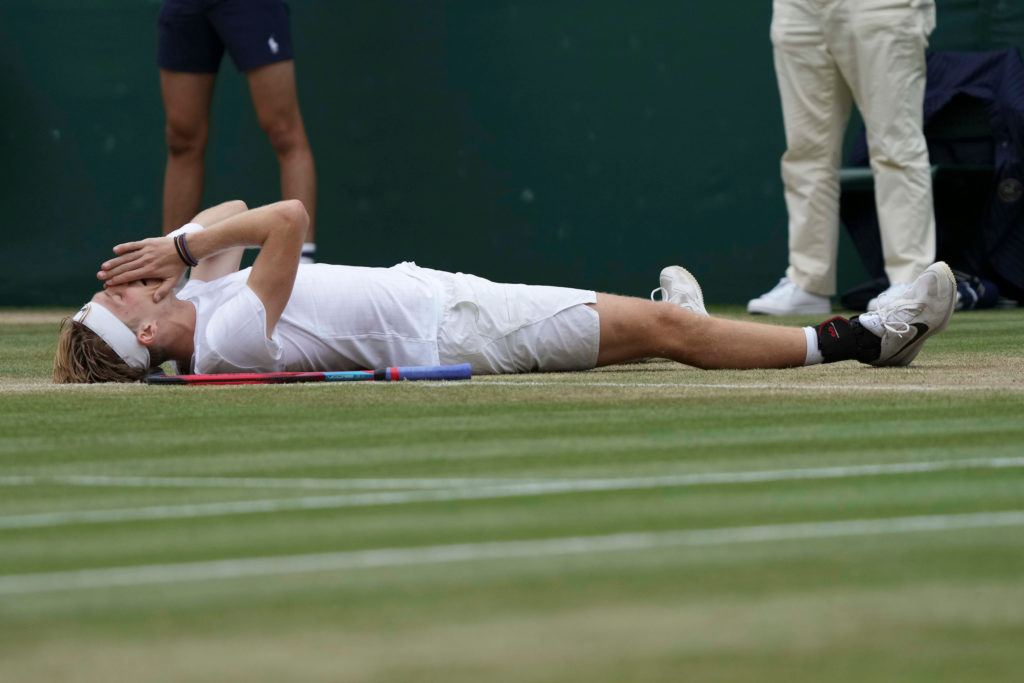
What happened with Denis happened before with young players like Nestor, Dancevic, Polansky, Peliwo, Schnur…
Do you still speak? Are you on good terms?
Of course, we’re on good terms. To be frank, we don’t speak that often. He’s travelling the world and pursuing his career. He’s built a new team. And I have my career. When an athlete works with another coach, that’s a relationship you have to respect. You can’t get involved and risk confusing the player. I’ve been following him, and I’m very happy when he does well. Just like all the other Canadian players.
Coaches don’t see that level of talent very often. Do you see that time as a gift?
It was a really great experience. A privilege, even. Players like Félix, Shapo, Bianca and Leylah—it’s very rare to have such huge potential at such a young age and be able to shape them and contribute to their emergence. Sylvain Bruneau experienced the same thing with Bianca, and Guillaume Marx with Félix. We were privileged to have three similar talents in our hands.
A lot of countries would love to have just one player like them. We had four in just a few years.
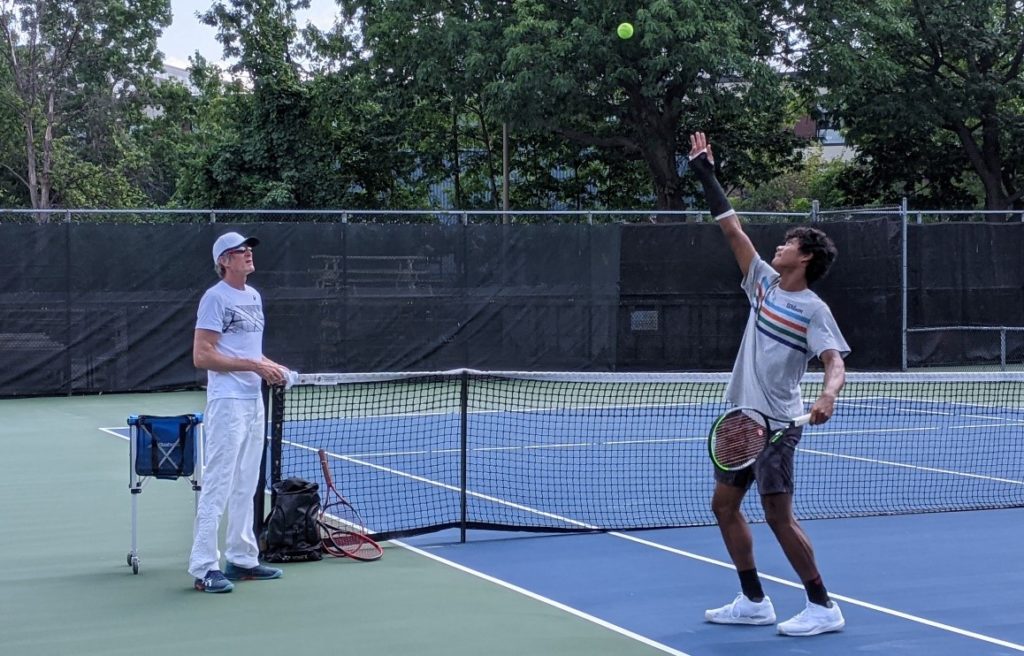
Would you go back on the road with another young talent if Tennis Canada asked you to?
That’s my world. That’s what I’ve been doing for 35 years as a player and a coach. Tennis is international, and you have to go where the tournaments are. For a year and half, in the pandemic, our programs were upended. The transition program was discontinued, and tournaments were cancelled. The future is uncertain and we take things day by day, but it’s still our responsibility to support athletes as much as possible, from the time they’re 14 until they reach the pros. As far as who does what, we’ll just have to see.
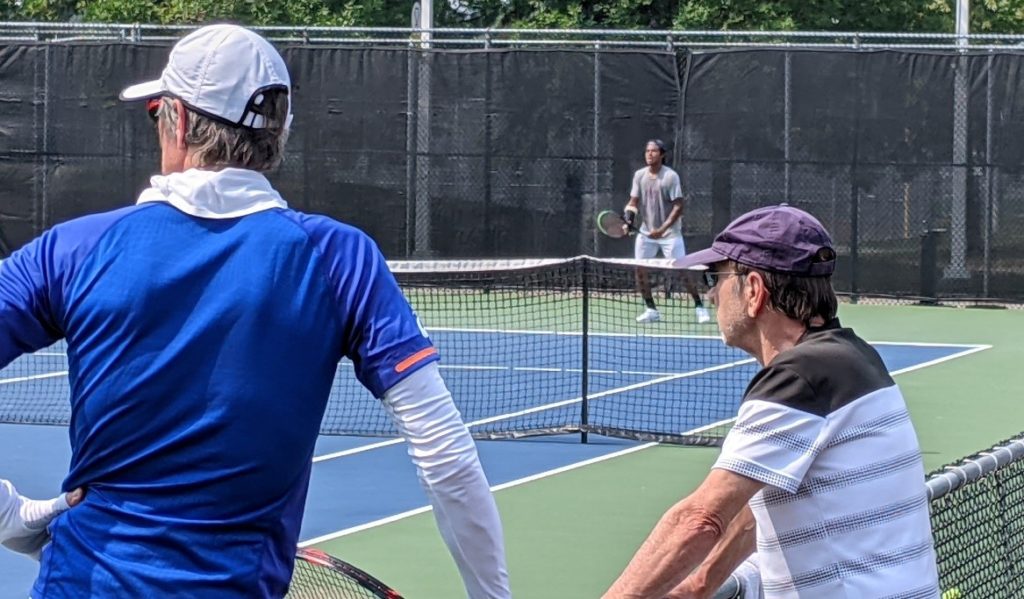
Chapter Borfiga
Louis Borfiga’s departure was met with a lot of fanfare in the press and Canadian tennis. What’s your take on his 15 years here?
I have so many great memories. We joined the world elite. The concept of a training centre is an accomplishment we had already been discussing prior to his arrival but we just didn’t have the funds to do it. With his arrival, things fell into place, and his experience helped build the system and spilled over to all the coaches. This is our golden age in international tennis in both the WTA and ATP, in Billie Jean King Cup and Davis Cup. And let’s not forget that our juniors have won Grand Slam titles. Two young women ranked as high as World No.5, and two young men are currently No.11 and No.12. Louis is someone who’s very discreet and reserved but also tremendously influential, and he helped us actualize a culture of champions.
It was such a pleasure working with him. I never saw him as a boss but as a colleague, especially since he’s a former player and coach. He enabled me to evolve in my career.
Get in touch with me!
Email: privard@tenniscanada.com
Twitter: @paul6rivard
Follow all our Canadians in action here.
